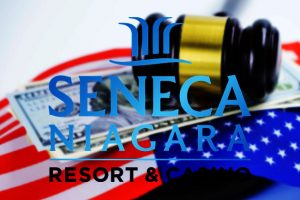 The Seneca Nation of Indians is still fighting for its rights to operate its casino venues without following the previous allocation pattern to New York State. The Native American tribe has filed federal court action that aims to vacate the arbitration panel of three individuals that ruled a US$255-million compensation has to be paid to the state.
The Seneca Nation of Indians is still fighting for its rights to operate its casino venues without following the previous allocation pattern to New York State. The Native American tribe has filed federal court action that aims to vacate the arbitration panel of three individuals that ruled a US$255-million compensation has to be paid to the state.
According to the tribe’s argumentation, the arbitration panel failed to interpret the compact conditions. This week was a special one for the Seneca Nation of Indians, as it asked the New York Federal Court to join the debate.
What it should do, according to the Native American tribe, would be to vacate the three-party arbitration panel that had to issue a decision on outstanding and future casino payments. Seneca Nation of Indians oversees tribal gambling locations to the likes of Seneca Niagara Falls Resort and Casino, Seneca Buffalo Creek Casino, and Seneca Allegany Resort and Casino.
Casino Allocations Ceased in March 2017
 March 2017 saw the end of mandatory payments listed in the tribal compact for operation negotiated with the New York State. It mandated that 25 percent of the gaming revenue amassed by the casino locations be sent to the state for various local projects. This amount is then divided among the host communities where the Seneca Nation of Indians oversees casino venues.
March 2017 saw the end of mandatory payments listed in the tribal compact for operation negotiated with the New York State. It mandated that 25 percent of the gaming revenue amassed by the casino locations be sent to the state for various local projects. This amount is then divided among the host communities where the Seneca Nation of Indians oversees casino venues.
As the tribal nation points out, the compact for operation came to an end at the end of 2016 and ever since then it has not been renewed. The 14-year period of allocations was not supposed to see an extension, at least according to the initial negotiations between the Native American tribe and the state.
This is what concerns the tribe, pointing out that the arbitration panel has no authority to make amendments to the contract making future payments possible. A federal review will have to take place, as the tribe refuses to accept the injustice that will have it pay some US$255,877,747.44. Projections soon after the arbitration panel issued its decision were that the tribe is going to take advantage of the Indian Gaming Regulatory Act.
Tribe Wants The Panel to Be Vacated
The United States Department of the Interior will have to make a thorough review of the details surrounding this entire situation. The Seneca Nation of Indians also made it clear that there was never an agreement for a compact extension past its last 14th year in 2016. The two parties involved in it never inked an arrangement that would see the following seven years of gaming revenue allocations to the state.
It was arranged in 2002, but it should be taken into account hat the last seven years of this arrangement and respective allocations were not specified by it. In response to the demand for a review, the Department of Interior stated that a joint submission from the Seneca Nation and the state will have to be presented before a review starts. This has prompted the motion seeking vacation of the arbitration panel or postponing enforcement to a later date.
Seneca President Rickey Armstrong, Sr. said that at this point the Native American tribe is open for discussion of the issue and collaboration with the state that will see the joint submission. In the meantime, the communities relying on regular allocations from their casino venues struggle with the financing of various projects. Niagara Falls officials decided to borrow US$12 million in order to fill in some holes in the budget and cover expenses.



















